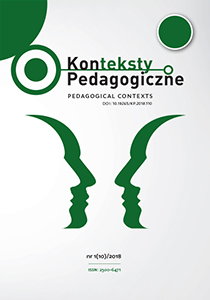Abstract
Although knowledge and awareness about the importance of emo-tions in teaching and communication with children is quite developed, in practice it still clashes with the traditional model of education and beliefs regard-ing the role of the school. Interactions between teachers and students are often considered less important than the substantive content of the subjects. The re-sults of the research, as well as the author’s personal experience as a didactic and trainer, indicate that young people often pay attention to the lack of emotional support from teachers, which results in difficulties both in school and in their personal life. The aim of this article is to draw attention to emotional aspects of development and the role of teachers in these processes, which are crucial for functioning and building relationships in adult life. The author cites concepts and research that confirm that teacher emotional support is an important pre-dictor of children’s educational achievements and the development of their social skills. The subject seems to be more important in the face of contemporary reali-ties. The ubiquitous transformation and technological leap cause that the area of education also requires reevaluation and new directions of action.
References
Białecka-Pikul, M. (2011). Wczesne dzieciństwo. W: J. Trempała (red.), Psychologia rozwoju człowieka (s. 172–201). Warszawa: Wydawnictwo Naukowe PWN.
Brock, L.L. i Curby, T.W. (2016). The role of children’s adaptability in classrooms cha-racterized by low or high teacher emotional support consistency. School Psychology Review, 45(2), 209–225.
Brzezińska, A. (2009). Nauczyciel jako organizator społecznego środowiska uczenia się. Forum Dydaktyczne, 5/6, 6–19.
Frank, D. i Bloom, P. (2010). Bred in the bone. The moral life of babies. The New York Times Magazine, https://www.nytimes.com/video/magazine/1247467772000/can--babies-tell-right-from-wrong-.html [dostęp: 19.12.2017].
Gleick, J. (2003). Szybciej: przyspieszenie niemal wszystkiego, przeł. J. Bieroń. Wydaw-nictwo Zysk i S-ka: Poznań.
Goleman, D. (2007). Inteligencja społeczna. Rebis: Poznań.
Ham, J. i Tronick, E. (2006). Infant Resilience to the Stress of the still-face. Infant and maternal psychophysiology are related. New York Academy of Sciences, 1094, 297–302.
Kielar-Turska, M. (2011). Średnie dzieciństwo – wiek przedszkolny. W: J. Trempała (red.), Psychologia rozwoju człowieka (s. 202–233). Warszawa: Wydawnictwo Na-ukowe PWN.
Kołodziejczyk, A. (2011). Późne dzieciństwo – młodszy wiek szkolny. W: J. Trempała (red.), Psychologia rozwoju człowieka (s. 234–258). Warszawa: Wydawnictwo Na-ukowe PWN.
Madalińska-Michalak, J. i Góralska, R. (2012). Kompetencje emocjonalne nauczyciela. Warszawa: Wolters Kluwers Polska SA.
McGonigal, K. (2016). Siła stresu. Jak stresować się mądrze i z pożytkiem dla siebie, przeł. K. Rojek. Gliwice: Wydawnictwo HELION.
Merritt, E.G., Wanless, S.B., Rimm-Kaufman, S.E. i Cameron, C. (2012). The contri-bution of teachers’ emotional support to children’s social behaviors and self-regula-tory skills in first grade. School Psychology Review, 41(2), 141–159.
Ohme, R. (2017). Emo sapiens. Harmonia emocji i rozumu. Wrocław: Wydawnictwo Bukowy Las Sp. z o.o.
Oleszkowicz, A. i Senejko, A. (2011). W: J. Trempała (red.), Psychologia rozwoju czło-wieka (s. 259–286). Warszawa: Wydawnictwo Naukowe PWN.
Ostolska, M. (2016). Rola uczuć w wychowaniu szkolnym. W: E. Lewandowska--Tarasiuk, J. Łaszczyk i B. Śliwerski (red.), Pedagogika serca. Wychowanie emocjonalne w XXI wieku (s. 152–161). Warszawa: Difin SA. Repacholi, B.M., Meltzoff, A.N., Rowe, H. i Spiewak Toub, T. (2014). Infant, control thyself: Infants’ integration of multiple social cues to regulate their imitative beha-vior. Cognitive Development, 32, 46–57.
Robinson, K. (2006). Ken Robinson twierdzi, że szkoły zabijają kreatywność. Wystąpie-nie zarejestrowane online TED ideas worth spreading, https://www.ted.com/talks/ken_robinson_says_schools_kill_creativity?language=pl [dostęp: 19.12.2017].
Rosenthal, R. i Jacobson, L. (1968). Pygmalion in the classroom. The Urban Review, 3(1), 16–20.
Sy, T., Cote, S. i Saavedra, R. (2005). The contagious leader: Impact of the leader’s mood on the mood of group members, group affective tone, and group processes. Journal of Applied Psychology, 90(2), 295–305.
Wróbel, M. (2017). Zarażanie afektywne. O procesie transferu emocji i nastroju między ludźmi. Warszawa: Wydawnictwo Naukowe PWN.
Zalewska-Bujak, M. (2014). Zarys interakcji komunikacyjnych nauczycieli z uczniami z perspektywy szkolnych doświadczeń studentów pierwszego roku pedagogiki. Kon-teksty Pedagogiczne, 1(2), 113–125.
In accordance with the recommendation of the Ministry of Science and Higher Education, which aims to counteract the practice of “ghostwriting” and “guest authorship,” all authors submitting their text for publication should attach an author’s statement which declares the contribution of each of the authors to the article. The printed and signed statement should be delivered by mail or other means to editor-in-chief Joanna Skibska or sent in the form of a scan to the following e-mail address: redakcja@kontekstypedagogczne.pl. The authors will not receive remuneration for publishing their papers. The editors reserve the right to make minor editorial changes to the articles which will not affect the substance of the article. We encourage all authors to prepare their articles in accordance with the guidelines for manuscript preparation. Download pdf file.
Authors transfer all copyrights and grant the journal the right of first publication with the work simultaneously licensed under a Creative Commons Attribution License that allows others to share the work with acknowledgement of the work's authorship and initial publication in this journal. All authors agree to the publishing of their email addresses, affiliations and short bio statements with their articles during the submission process.

